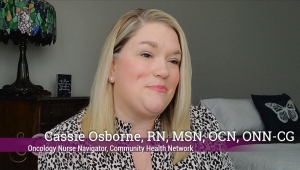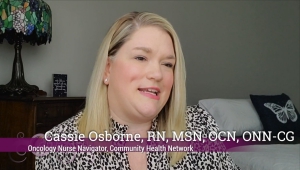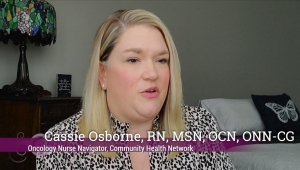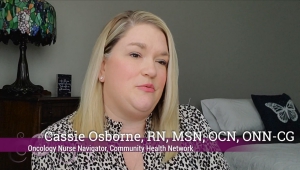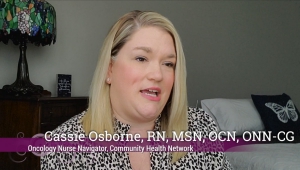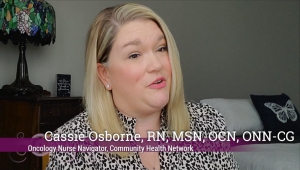Video Library Categories
- Acuity
- AONN+ Memories
- Barriers to Care
- Best Practices
- Best Practices in CAR T-Cell Therapy
- Board of Trustees
- BOLD
- Breast Cancer
- Cancer Biomarkers
- Cancer-Related Legal Issues
- CAPE CLL
- Caregivers
- Case Studies
- Chronic Disease
- Clinical Pearls
- Clinical Trials
- CoC Standards
- Commission on Cancer
- Committees
- Conference Testimonials
- Coordination of Care/Care Transitions
- COVID-19
- Distress Screening
- Evidence into Practice
- Financial Navigation
- Financial Toxicity
- Genetics and Genomics
- Health Disparities
- Heroes of Hope
- Immunotherapy
- Integrative Cancer Care
- Local Navigator Networks
- Member Benefits
- Membership Testimonials
- Mental Health
- Navigation
- Navigator Anecdotes
- Navigator FAQs
- Networking and Community
- Novice Navigators
- Nurse Navigation
- Nurse Navigators Video Vignette Series
- Oncology Care Model
- ONE Award
- Operations Management
- Patient Advocacy/Empowerment
- Patient FAQs
- Patient Navigators
- Policy and Advocacy
- Precision Medicine
- Products and Devices
- Professional Roles and Responsibilities
- Psychosocial Support Services/Assessment
- Reducing Racial Disparities in Cancer Care
- Research
- Research/Quality/Performance Improvement
- Role of the Navigator
- Sexuality and Cancer
- Standardized Metrics
- Starting a Navigation Program
- Support Services
- Survivorship
- Technology
- Telehealth
- Tools and Resources
- Town Hall and Panel Discussions
- Tumor Boards
- Value-Based Care
- What's Your Why?
Coordination of Care/Care Transitions
Advocating for Your Patients with Metastatic Disease
Patients with metastatic disease rely on their oncology navigator to help meet their treatment needs, psychosocial needs, family needs, and individual needs.
Misconceptions About Metastatic Disease
Cassie Osborne, RN, MSN, OCN, ONN-CG explains the misconceptions patients can have when they receive a metastatic disease diagnosis.
Supporting Metastatic Disease Patients
Healthcare needs a greater focus on metastatic survivors and establishing treatment goals that the patient wants to proceed with.
Advocating for Metastatic Survivors
Cassie Osborne, RN, MSN, OCN, ONN-CG shares how oncology navigators serve as the voice of their patients who are living with metastatic disease.
Lack of Survivorship Support for Metastatic Disease Patients
Patients are living longer and thriving with metastatic disease, but there are still a lot of complications and concerns that need to be addressed for this patient population.
Chronic and Metastatic Patients
Patients who are living with chronic and metastatic disease face a unique set of challenges in their care coordination.
Knowing a Patient’s Cancer Risks
Andi Dwyer, BS, explains how oncology navigators and their patients need to be aware of their risks of cancer to know how to best move ahead with cancer screenings.
Long-term Consequences of Delayed Cancer Screenings
As we begin to move forward from the COVID-19 pandemic, there are long-term consequences of the delay in cancer screenings that need to be addressed immediately.
Assisting Patients in Timely Cancer Screenings
Oncology navigators can help their patients feel comfortable to come in for cancer screenings by educating them and empowering them with the knowledge they need to make informed decisions.
How are Hospitals Keeping Patients Safe During the Pandemic?
Hospitals and medical providers are following safety and cleaning guidelines and considering capacity to minimize risk of COVID-19 for patients.
Thank You to Our Corporate Sponsors and Alliance Partners!

Major Corporate Sponsor

Patron Corporate Sponsor

Patron Corporate Sponsor

Patron Corporate Sponsor

Industry Relations
Council Member

Industry Relations
Council Member

Industry Relations
Council Member

National Alliance Partner

National Alliance Partner

National Alliance Partner

National Alliance Partner

National Alliance Partner

National Alliance Partner
Privacy Notice | Terms of Use
© 2009- DBA AONN+ Academy of Oncology Nurse & Patient Navigators® | PO Box 357387, Gainesville, FL 32635-7387 |
AONN+ DBA AONN+ is a 501(c)(6) organization under federal tax guidelines. AONN+ Foundation for Learning, Inc. a 501(c)(3) organization under federal tax guidelines.
AONN+ Advantage, LLC, a wholly owned subsidiary of AONN+.

